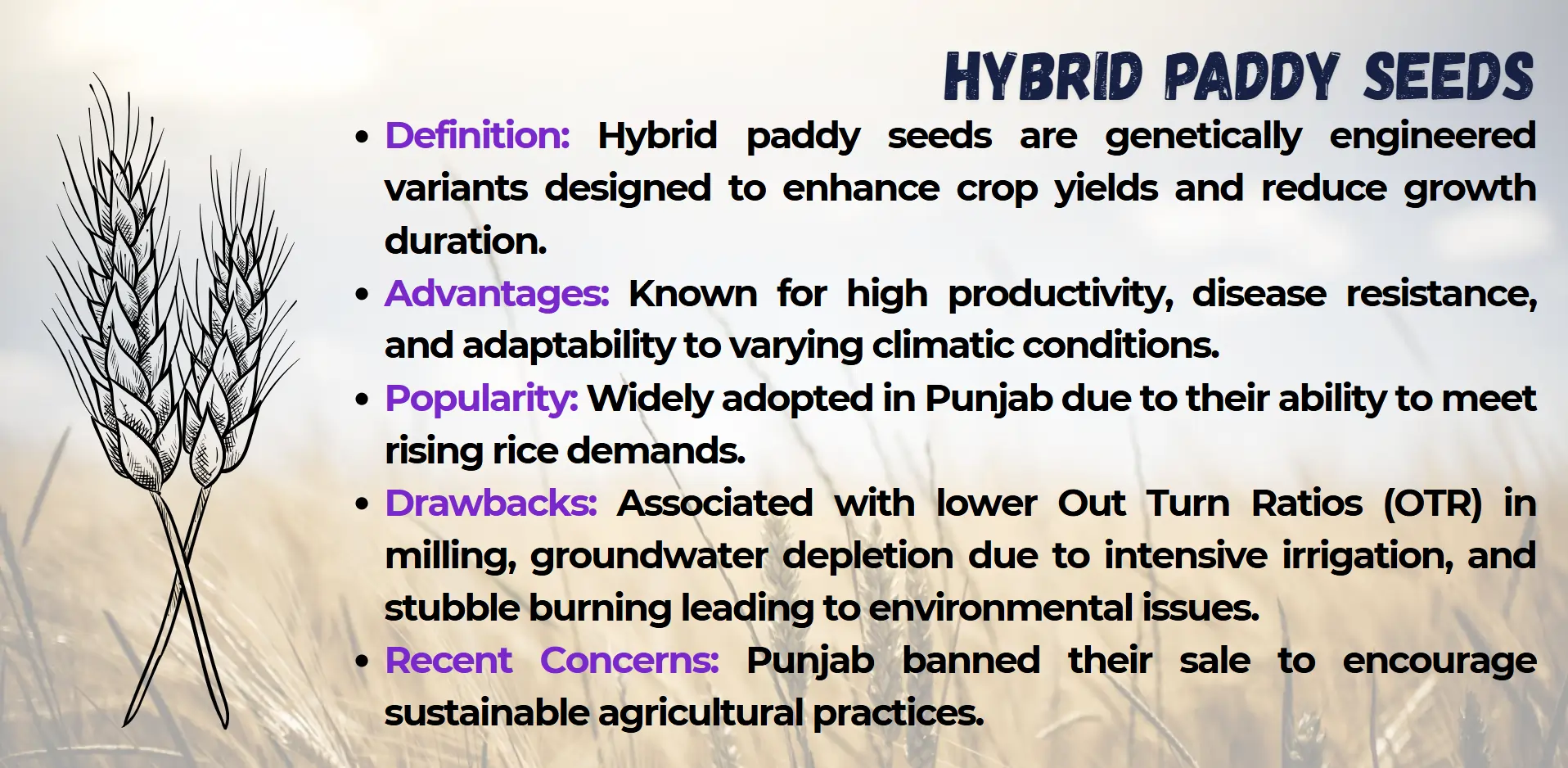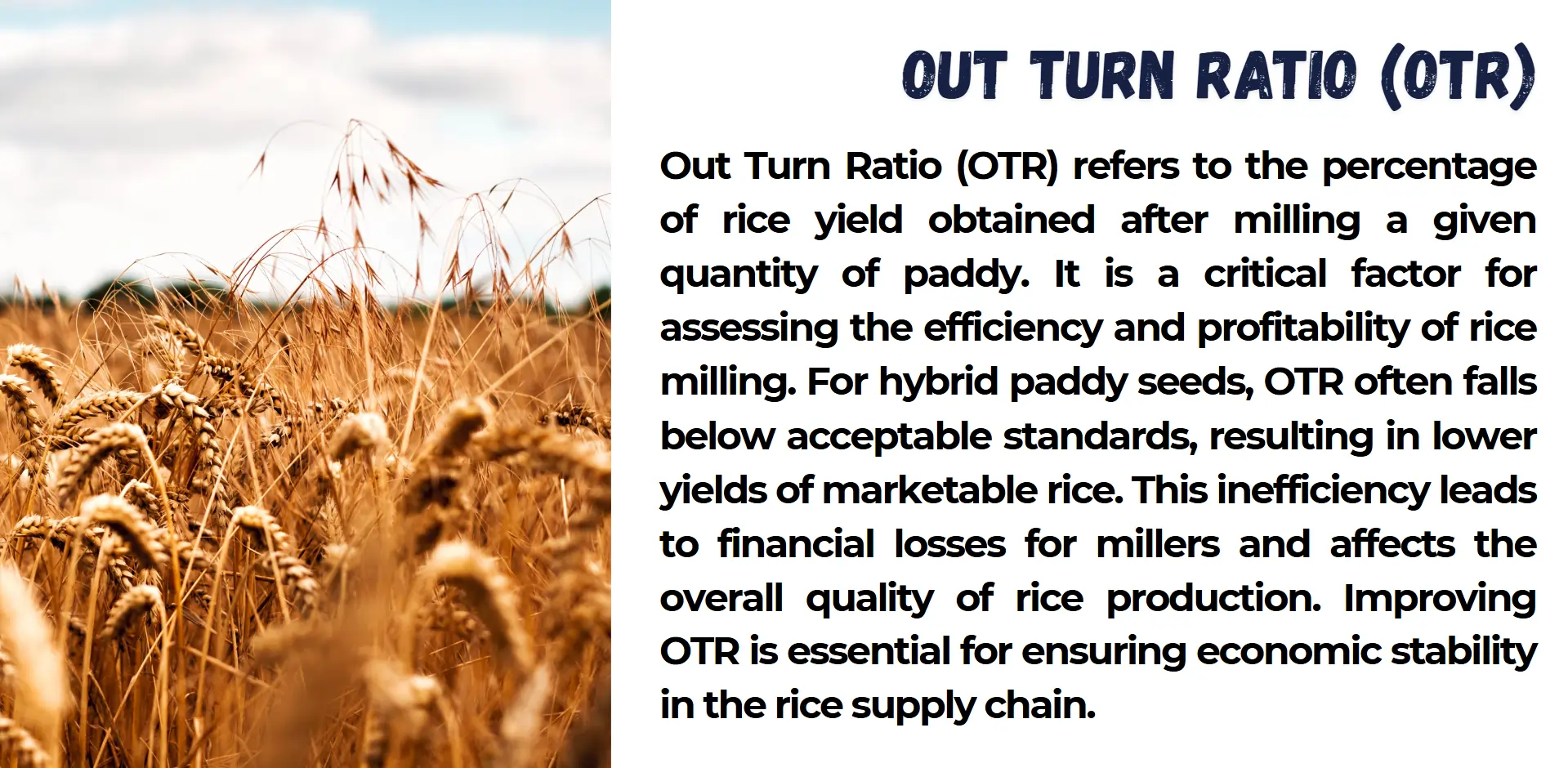Punjab establishes a ban on hybrid paddy seeds to address two primary issues within the agricultural sector including milling problems and environmental conservation. The state's decision establishes harmonious conditions between farming production rates and environmental sustainability to support long-term preservation of the agricultural sector.

The Indian state of Punjab has established an important new policy to stop selling hybrid paddy seeds. The grain industry and environmentalists together with seed experts and public officials have engaged in substantial dialogue after the provincial ban on hybrid paddy seeds. Punjab has implemented the ban on hybrid paddy seed sales because of major environmental concerns and milling effectiveness problems related to these seeds which lead to groundwater depletion and stubble burning. People agree and disagree about the sustainability of hybrid varieties because these crops deliver enhanced yields but also lead to numerous negative impacts that affect both economic systems and farming sustainability in the long-term. The ban emerged after experts from the Punjab Agricultural University and other multiple organizations recommended it to achieve both environmental sustainability and agricultural production levels. The Article examines the decision paradigm including its underlying motivations while analyzing resultant effects and viable sustainable farming solutions within Punjab.
Background
Since the beginning Punjab has developed into a leader for agricultural innovations which allows it to remain the top rice-producing state of India because of its modern farming practices. The implementation of hybrid paddy seeds has become a controversial matter because it produces sustainability and efficiency concerns.
What Are Hybrid Paddy Seeds?
The developers have created genetically modified hybrid seeds from paddy grains that increase output and minimize growing cycles. Farmers receive numerous benefits from hybrid paddy seeds such as increased production levels and strengthened disease immunity and flexible responses to environmental changes. The farming community has chosen hybrid seeds because of their economic advantages while producers extensively use them to satisfy increasing rice cultivation needs. The disadvantages of these seeds need to be seriously considered.

Why Were Hybrid Paddy Seeds Popular in Punjab?
Residents in Punjab choose hybrid seeds because these seeds offer rapid and expansive harvests. The seeds proved beneficial for states that depend on their fertile soil and agricultural abundance because they provided increased yields. The seed companies promoted the hybrid seeds to farmers as transformational by using active advertising methods which secured a permanent space in agricultural operations.
Challenges Associated with Hybrid Paddy Seeds
Hybrid paddy seeds face challenges because they produce less efficient milling products while causing unfavourable effects to the environment. The Out Turn Ratio (OTR) that millers obtain from hybrid rice production frequently does not reach suitable levels which results in financial losses for the industry. Passionate watering of these seeds uses substantial amounts of groundwater along with creating eco disproportions between nature and surrounding habitats.
Past Policies and Practices
A previous ban on hybrid paddy seed sales by Punjab has been implemented to confront both milling problems and environmental issues. Previous agricultural rules proved inadequate because they lacked proper implementation and control along with restricted coverage area resulting in short-lived outcomes.
The Ban: Key Details
Punjab takes a major step by prohibiting the trade of hybrid paddy seeds to address fundamental agricultural, environmental, and money-based matters. The policy works toward preserving rice production sustainability through the development of measures that protect ecological integrity.
- Scope and Implementation of the Ban: Hybrid paddy seed varieties have been identified by experts and policymakers as being subject to the prohibition on their sale and use. The government imposed the restriction across the entire Punjab region through system-based monitoring to enforce it. The government operates hand-in-hand with agricultural institutions to help farmers transform to new crops and different seed varieties.
- Reasons for the Ban: The main cause behind this policy measure stems from the bad milling performance of hybrid paddy seeds that shows itself through reduced Out Turn Ratio (OTR) during rice processing. Strong financial losses occurred at rice mills because of their reduced yield productivity. Environmental issues involving groundwater depletion and stubble burning combined with these factors to strengthen the need for adopting a new method of action. The excessive use of irrigation water by hybrid seeds has worsened Punjab's existing problem of falling groundwater levels because these seeds require high amounts of irrigation.
- Expert Recommendations: According to experts at the Punjab Agricultural University (PAU) the government formed its decision regarding hybrid paddy seeds. University researchers analyzed the adverse impacts of these varieties on environment and economy to prove the necessity of sustainable alternatives with productive features. The authorities' proposals became fundamental elements for reaching official choices.
- Impact on Farmers: Farmers exhibit varying opinions about the implemented restriction. The implementation of sustainable practices finds critical support from some segments but economic uncertainties concern other parts of the population. Punjab farmer’s maintained popularity for hybrid seeds because of their high yield potential combined with shorter growth cycles but they worry their income will decrease when switching to alternative plant selections.
- Political and Social Reactions: The policy has started an intense debate about its merits and faults among politicians together with activists who focus on environmental issues. The restriction faces opposition that favours a comprehensive solution amidst the diverse agricultural problems that Punjab needs to solve.
Stakeholder's Perspectives
Multiple interest groups including governmental officials, agricultural scientists and farming communities and seed businesses respond differently to the implementation of the hybrid paddy seed ban policy in Punjab.
The Government's Rationale
The Punjab government continues to support farm restrictions because this policy protects both farm sustainability and environmental sustainability. The government works to establish a sustainable farming system through fixes of both groundwater problems and mill consolidation weaknesses. The administration supports its ban decision with research findings from Punjab Agricultural University (PAU) which establishes that future advantages exceed current difficulties.
Farmers’ Concerns and Reactions
People in the agricultural sector show various opinions about the prohibition which demonstrates the complicated nature of the matter. Some farmers endorse the new measure because they understand hybrid seeds create environmental hazards yet other farmers fear this decision will reduce their financial success and agricultural output. People trusted hybrid seeds to provide greater crop yields and shorter maturation times so changing to another seed variety might result in economic hazards. Planting seeds in the farming community frequently leads to disagreements since some growers face difficulties obtaining inexpensive seed replacements and worry about their effectiveness.
Experts and Environmentalist's Perspectives
The prohibition of agricultural experts together with environmental activists receives support mainly due to its capacity to resolve groundwater shortages and stop the destructive effects of destroying stubbles through burning. Although the use of hybrid paddy seeds produced positive short-term results, but the Punjab's ecological system was overburdened. Environmental specialists push for diverse crop systems because they believe strategies built for soil health and water preservation along with climate resistance progress are essential.
The Seed Industry's Response
Private companies that focus on hybrid seeds together with their partners have fiercely opposed the implementation of this ban. The producers maintain hybrid seeds receive unjustified scrutiny because the real issues stem from milling problems and inefficient water management at large. Such businesses worry about substantial monetary repercussions thus they request an approach which deals with the issue on a fair basis.

Millers' Standpoint
Since hybrid paddy seed produce low Out Turn Ratios (OTR), most millers in India have supported the ban that applies to their operations. The policy offers them an opportunity to improve milling operations and produce quality according to their view.
Implications of the Ban
The Punjab Government's prohibition of hybrid paddy seeds represents a critical juncture which affects the agricultural story while producing multiple consequences involving economic conditions and environmental concerns together with societal effects.
Economic Impact on Farmers and Industry
The prohibition directly impacts farmers because hybrid paddy seeds provided them with maximum yield potential. Small and marginal farmer groups expect their incomes to decrease because of degraded yields when moving from hybrid seeds to new seed varieties during the transition phase. The seed industry experiences financial losses at this time and private companies that handle hybrid seeds bear the greatest impact. The millers stand to gain benefits because improved non-hybrid seed milling efficiency generates better yields together with reduced monetary costs.
Environmental Benefits
The ban has numerous environmental advantages as its main result. The requirement for excessive irrigation with Hybrid paddy seeds leads to severe groundwater depletion throughout Punjab. The ban on hybrid seed usage in Punjab will result in better water conservation practices that will lead to sustainable farming. The decrease in hybrid paddy seed-related stubble burning practice will help decrease environment-damaging emissions thus improving overall environmental quality.
Social and Political Repercussions
This policy creation has produced extensive discussions among cultivators and governmental agents as well as advocacy groups which resulted in rising political discussions about agricultural change initiatives. Some agricultural producers endorse the policy modification but various other farmers see it as an excessive governmental intrusion which requires improved transition support payments. The implementation of this political measure shows how sustainability affects agriculture policy so other states may use it as a guide for future agricultural regulation.
Shift towards Sustainable Practices
The ban promotes farmers to transition their practices from maximizing productivity to focus on sustainability. The state of Punjab leads the way for sustainable agricultural systems by supporting farmers to implement less water-dependent crops together with innovative cultivation practices. These strategic changes support international environmental initiatives and promote food safety throughout the globe.
Potential for Research and Innovation
The decision emphasizes that the agricultural sector requires advanced research together with innovative solutions. Research on seed development should combine yield effectiveness and environmental protection strategies to compensate for the absence of hybrid paddy seeds. Public government backing of these programs shows promise to become critical assets in the future.
Alternatives and Solutions
The government of Punjab needs to adopt sustainable alternatives together with innovative solutions to maintain agricultural productivity while protecting environmental and economic steadiness.
Adoption of Low-Water-Consuming Crops
The most practical substitute involves encouraging farmers to grow low-water-dependent crops including millet, pulses and maize. These crops lower the demands made on groundwater reserves and simultaneously improve land fertility. Such alternatives need government support through enabling policies in addition to financial incentives for farmers to be economically attractive.
Development of Advanced Seed Varieties
Research investments in the production of seeds which deliver high yields while using water more efficiently must be carried out. The agricultural institutions together with private enterprises needs to create new seed varieties that combine hybrid technology benefits with sustainable operations. Farmers obtain value when they access improved plant varieties designed for environmental sustainability.
Implementation of Sustainable Farming Practices
DSR direct seeding of rice serves as a sustainable practice which allows organizations to cut both labor costs and water consumption needs. The agricultural practice of rotating crops combines with organic farming to develop soil health in both the short and long term which results in higher productivity and better environmental conservation outcomes. Extensive farmer training and supply of necessary resources will lead to successful adoption of these conservation measures.
Policy Support and Farmer Incentives
To help farmers transition successfully the government needs to provide financial aid alongside access to reasonable technological alternatives and funding through subsidies. The establishment of complete support structures featuring technical help along with assured procurement programs ensures farmers can successfully implement new regulations.
Public Awareness and Education
The public requires education about sustainable agriculture diversification practices together with basic information for farmers. Awareness initiatives connect informative material to educational content that helps people join environmental farming efforts.
When Punjab adopts these different cultivation methods they will obtain equilibrium between agricultural sustainability and meet the objections stemming from the ban.
Conclusion
A paddy seed hybrid prohibition established by Punjab represents an important advancement for maintaining agricultural sustainability. Punjab tackles its main water resource deficit, food processing issues and environmental problems by implementing measures that prove agricultural productivity must remain balanced with ecological conservation. The process of transitioning to sustainable farming demands cooperation among farmers and researchers together with policymakers although farmer self-participation remains vital. The prohibition provides both Favorable and detrimental effects for Punjab which generates new agricultural facilities that protect financial stability and environmental health. The progress of sustainable farming in Punjab requires appropriate modifications to occur alongside effective dialogues.